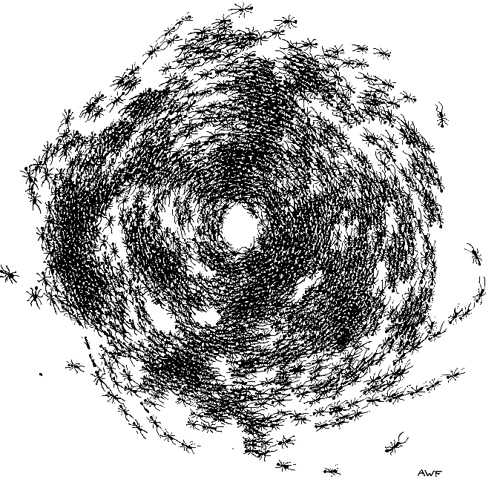I’ve always loved ants.
This summer I finally read the canonical, impractically massive book about them, The Ants.

It’s changed the way I look at the world. Which is what happens whenever I dig deeply enough into pretty much any subject. For example, I never really noticed shadows in the real world until I had to create them by hand in virtual worlds. And now it’s like I’ve added a whole new color to the world around me. I want to make games that can do that.
Oddly enough, I think surreal games have a great shot at that because putting players into unfamiliar situations encourages them to think unfamiliar thoughts. Of course the challenge is making the experience familiar enough at some level that those new thoughts are actually relevant outside the game too.
I think ants are a good example of that mix: their orderly marches make them seem fascinatingly human, but their single-mindedness is terrifyingly inhuman. Here are a few of the more surprising, amusing and ghastly things I learned about ants:
Ants don’t play.
Male ants are born without mouths in some species because they don’t live long enough to need them.
Ants are as violent and nasty as people. Like us, they’re their own worst enemies. In addition to the constant fighting and raiding that goes on between colonies, some species have evolved to be particularly horrible to one another. Like the slavemaker ants who enslave members of other colonies. Or one species whose queen will sneak into a neighboring colony and start quietly cutting the head off the host queen. “When this is accomplished, sometimes only after many hours, [she] takes over as the sole reproductive, and the colony eventually comes to consist entirely of her offspring and herself.”
Self-sacrifice actually makes sense for an ant. This one is hard to wrap your head around. Most ants can’t reproduce (that’s the queen’s job). So whether or not an individual survives makes no difference to evolution, since that individual won’t be passing on their genes anyway. What’s important is that the COLONY survives. For us, personal survival is an overwhelming imperative. But for an ant, survival is just one of several options. Well, one of two, I guess.
They have some of the worst jobs imaginable. Take, for example, the honeypot caste. Their job is to store food for the colony like a living refrigerator. They wait back in the nest while workers stuff them with food. In some species they get so bloated they can’t even move.
They spend most of their life doing absolutely nothing. They don’t even sleep. They just… stand there. For close to 80% of their lives. If I try hard I can kind of picture being a cat and spending my life sleeping in another man’s chair. But I can’t imagine what it’d be like to just stand still most of your life. For an attempt at this see Buñuel’s Simon of the Desert.
They’re phenomenally stupid. With their beautifully simple set of behaviors ants can seem a lot like robots. Really stupid robots. For example, they recognize dead ants based on a chemical that corpses give off. But what happens if you spray the same chemical on an ant who’s still alive? “…they are picked up and carried, unprotesting, to the refuse pile. After being deposited, they clean themselves and return to the nest. If the cleaning was not thorough enough, they are sometimes mistaken a second or third time for corpses and taken back to the refuse piles.”
I mean it, unimaginably stupid. So here’s one of the most ridiculous things I’ve ever heard. Army ants travel in massive columns which advance by having worker ants rush out just beyond the advancing edge and then turn back in, to be replaced by another wave of workers just behind them. So far so good. But “when masses of workers are dumped onto a clean flat surface or are cut off from the rest of the colony by rain, they commence ‘circular milling.’ In this bizarre formation workers go forward and inward with the crowd but not outward in a centrifugal direction, so that the whole mass continues to circle round and round until all the ants are dead.”


4 Responses to What I learned from The Ants